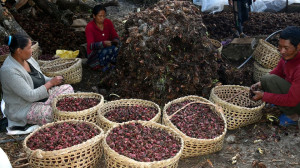Money
Tarai unrest, embargo, supply disruptions batter economy
Fewer new factories were registered and investments including foreign direct investment (FDI) slowed in the current fiscal as the country buckled under prolonged unrest in the Tarai, a devastating trade embargo and supply disruptions.
Bibek Subedi
Fewer new factories were registered and investments including foreign direct investment (FDI) slowed in the current fiscal as the country buckled under prolonged unrest in the Tarai, a devastating trade embargo and supply disruptions.
Nepal’s private sector will remember fiscal 2015-16 as the worst of times. From the Gorkha Earthquake in April 2015, the private sector faced a series of challenges throughout the fiscal year. Political bickering over the new constitution followed by an unofficial blockade by India hit the manufacturing sector the hardest as factories across the country battled for survival.
With the greater part of the fiscal year being marked by political turmoil, industrial output hit new lows. The fact that the industrial sector suffered negative growth is evidence of this. The Economic Survey unveiled on Thursday shows that the industrial sector saw a negative growth of -6.3 percent this fiscal year.
In an indication of the private sector’s eroding confidence, registrations of new factories at the Department of Industry took a dive this year. Economic Survey 2015-16 shows that a total of 219 new companies were registered in the first eight months against 462 last year. The 219 new companies account for a combined investment of Rs42.69 billion and provide 9,567 jobs. In the previous year, investments by new companies totalled Rs132.91 billion, and they provided employment to 22,581 people.
Economists said such a decline in registrations and investments was expected given the political and economic upheaval wrought by delayed rehabilitation and reconstruction and the trade blockade.
“Because of the political instability, delayed reconstruction work and acute shortage of energy, it would have been pretty surprising if there had been a rise in investments,” said former finance secretary Rameshwar Prasad Khanal. “It is true that private sector confidence has hit rock bottom and they are reluctant to make new investments or expand their existing operations.”
Investors are doubtful of the future trajectory of Nepal’s politics and economic policies. According to industrialists, what is more worrying is the future as political polarization has escalated with the possibility of an explosion in the near future. “Unless the current political turmoil in the Tarai is resolved, private sector confidence is less likely to rise,” said Pashupati Murarka, president of the Federation of Nepalese Chambers of Commerce and Industry (FNCCI).
Khanal added even if a political agreement is reached among the parties and the current political deadlock is resolved, the transition period is likely to prolong as the implementation of the new Constitution will take some time. “So the industrial sector’s performance is likely to be affected in the future too,” said Khanal.
Along with domestic investment, FDI dipped during the rev-iew period. Investments totalled Rs6.87 billion in the first eight months of the fiscal year compared to Rs67.41 billion in 2014-15.
Although FDI commitments were higher, a deteriorating business environment resulted in low disbursement. “Unless the country’s business environment becomes better, FDI will keep decreasing,” said Murarka.




 7.73°C Kathmandu
7.73°C Kathmandu















